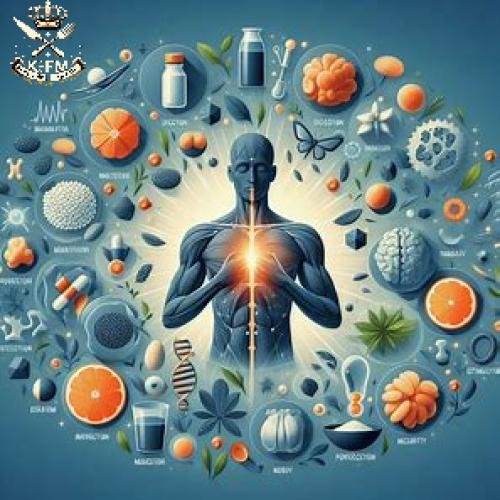
🔸 The Compounds of Honey and Its Healing Importance
Honey is a gift from nature, mentioned in the Qur'an as a drink that contains healing for people. Allah says in Surah An-Nahl:
"From its belly comes a drink of varying colors, in which there is healing for people" (verse 69).
The Prophet Muhammad (peace be upon him) also affirmed the benefits of honey in the hadith: "Honey is a remedy for every illness" (narrated by Al-Bukhari).
Honey is not just a food; it is a natural miracle that contains a variety of compounds that enhance health and protect the body from diseases. Let’s explore these compounds and their effects on the body:
🔹 First: Natural Sugars
Honey contains a range of natural sugars, including fructose and glucose. Fructose constitutes about 40% of honey's composition, while glucose makes up around 30%. Additionally, honey contains approximately 10 other types of sugars. These sugars are not only a source of energy but also play a vital role in maintaining blood sugar levels and providing the body with necessary energy. This makes honey ideal for athletes or anyone needing an energy boost.
🔹 Second: Enzymes
Honey is rich in essential enzymes such as amylase, catalase, and ptyalin. These enzymes play a crucial role in digestion and metabolism, enhancing the body’s ability to absorb nutrients more effectively. They also support digestive health, help resolve issues like constipation and stomach ulcers, and promote the growth of beneficial bacteria in the intestines.

🔹 Third: Organic Acids
Honey contains more than eight organic acids, including citric acid, oleic acid, and phosphoric acid. These acids help boost the immune system, prevent respiratory and lung diseases, as well as inflammation and viral infections.
🔹 Fourth: Mineral Salts
Honey contains more than 134 minerals, such as potassium, magnesium, sodium, calcium, iron, and copper. These minerals are essential for maintaining the body's health, promoting growth, maintaining fluid balance, supporting bone health, and aiding nerve function.
🔹 Fifth: Vitamins
Honey contains over 10 vitamins, including vitamin B1, B2, B6, and B5. These vitamins play an important role in enhancing overall health, supporting metabolism, and improving skin and hair health.
🔹 Sixth: Calories
Honey provides more than 30% of its content as calories, which serve as an important source of energy. These calories not only offer an energy boost but also contribute to improving physical and mental performance.
🔹 Seventh: Helps with Sleep
Honey contains natural sugars that help increase serotonin levels in the brain, promoting relaxation and aiding in a peaceful sleep.
🔹 Eighth: Treats Wounds and Burns
Honey has been used since ancient times to treat wounds and burns, as it helps speed up the healing process and reduce inflammation.
How to Choose Good Honey:
- Check the Source: Choose honey from a trusted source or from stores selling natural honey.
- Ensure Purity: Natural honey does not contain additives or added sugars. You can test honey by adding a small amount to cold water; if it dissolves easily, it may be a sign that it contains additional substances.
- Look for Organic Honey: Organic honey is the best choice because it is collected from flowers that have not been treated with pesticides or chemicals.
- Test the Taste and Color: Good honey is often rich in flavor and has a dark color. Some types, like Manuka honey, have a strong taste and dark color.
Using Honey in Your Daily Diet:
- Add to Drinks: You can add a spoonful of honey to tea or warm water with lemon to boost the immune system.
- Add to Breakfast: You can use it with yogurt or add it to cereals or oatmeal for a naturally sweet taste.
- Use in Baking: Honey can be used as a sugar substitute in recipes like cakes or pancakes.
- Sweeten Natural Juices: You can replace sugar with honey in juices or smoothies for a sweet taste and added health benefits.
Precautions When Using Honey:
- Avoid Giving Honey to Children Under One Year: Honey should not be given to children under one year old due to the risk of foodborne botulism, as it may contain bacteria harmful to infants.
- Be Cautious if You Have Allergies: Some people may be allergic to honey or the pollen in it. Therefore, it's best to conduct a simple test before using it regularly.
- Moderation in Quantity: Honey should be consumed in moderation as it contains sugars that may affect blood sugar levels if taken in large quantities.
Frequently Asked Questions:
- Can Honey Be Used to Treat Diabetes?
- Honey contains natural sugars such as fructose and glucose, which may affect blood sugar levels. Therefore, it is recommended that people with diabetes consult their doctor before consuming large amounts of honey or using it as a sugar substitute.
- What is the Recommended Amount of Honey to Consume Daily?
- It is recommended to consume 1-2 teaspoons of honey daily to enjoy its benefits without affecting overall health or causing weight gain. The amount can be increased gradually based on need or health goals.
- Does Honey Cure All Diseases?
- While honey has many health benefits, it is not a cure-all. It can help boost immunity and treat some minor conditions like sore throats, but it does not treat serious or chronic diseases.
- Can Honey Be Taken with Medications?
- If taking specific medications, it is best to consult with a doctor before regularly consuming honey to avoid potential negative interactions between honey and medications, especially for those on medications that affect blood sugar levels.
🔸 In Conclusion
During the challenging times we are facing, such as the COVID-19 pandemic, consuming honey regularly can have a positive impact on the body's health. It helps boost immunity, fight inflammation, and reduce the harmful effects of bacteria and fungi.
I recommend everyone to make honey a part of their daily diet, as it is not only a delicious food but also a natural remedy that is beneficial to health. May Allah grant us all health and safety.




















